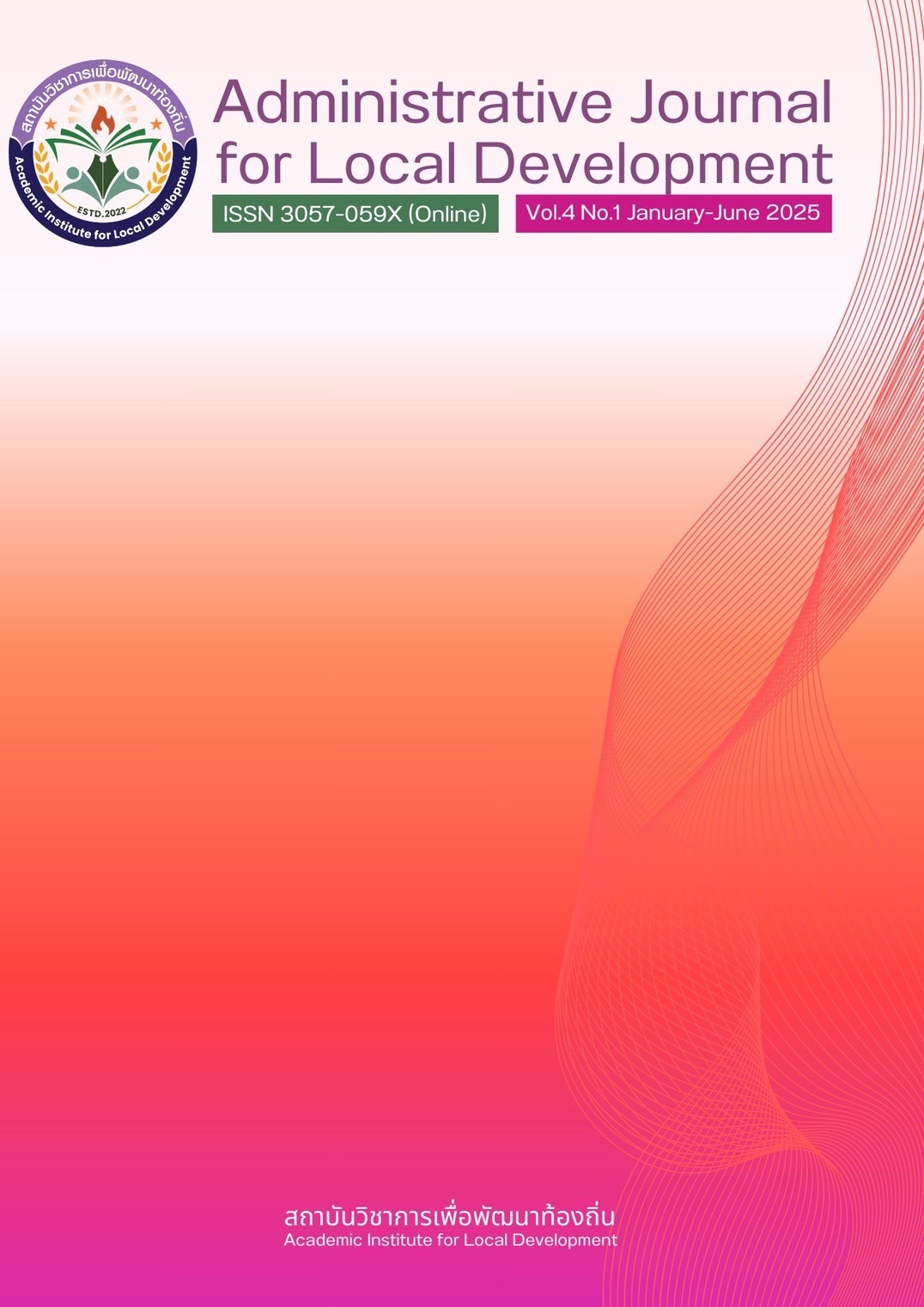Models of Community Self-Reliance: Frameworks, Strategies, and Global Perspectives
DOI:
https://doi.org/10.14456/ajfld.2025.8Keywords:
Models of Community Self-Reliance, Frameworks, Strategies, Global PerspectivesAbstract
A key idea in promoting sustainable development is community self-reliance, which gives local communities the ability to handle their own socioeconomic and environmental problems. Using information from interdisciplinary research and global case studies, this review article investigates the theoretical frameworks, models, and tactics that support community self-reliance. It looks at important paradigms such as community-based projects, cooperative alliances, and sustainable livelihood strategies, emphasizing how well they work in various settings. The article also discusses methods for creating self-sufficient communities, with a focus on governmental support, resource use, and capacity-building. Along with new developments and trends in the industry, issues including governance restrictions, resource scarcity, and socioeconomic inequality are covered. This review offers practical suggestions for policymakers, practitioners, and community leaders to improve self-reliance and promote sustainable, inclusive development by comparing methods and lessons learned across the globe.
Downloads
References
Acharya, K. P. (2002). Twenty-four years of community forestry in Nepal. International Forestry Review, 4(2), 149-156. https://doi.org/10.1505/IFOR.4.2.149.17408
Adger, W. N. (2000). Social and ecological resilience: Are they related? Progress in Human Geography, 24(3), 347-364. https://doi.org/10.1191/030913200701540465
Aker, J. C. (2011). Dial “A” for agriculture: Using information and communication technologies for agricultural extension in developing countries. Agricultural Economics, 42(6), 631-647. https://doi.org/10.1111/j.1574-0862.2011.00545.x
Berhane, G., Gilligan, D. O., Hoddinott, J., Kumar, N., & Taffesse, A. S. (2014). Can social protection work in Africa? The impact of Ethiopia’s Productive Safety Net Programme. Economic Development and Cultural Change, 63(1), 1-26. https://doi.org/10.1086/677753
Berkes, F. (2009). Indigenous ways of knowing and the study of environmental change. Journal of the Royal Society of New Zealand, 39(4), 151-156. https://doi.org/10.1080/03014220909510568
Berkes, F., & Ross, H. (2013). Community resilience: Toward an integrated approach. Society & Natural Resources, 26(1), 5-20. https://doi.org/10.1080/08941920.2012.736605
Bornstein, D., & Davis, S. (2010). Social entrepreneurship: What everyone needs to know. Oxford University Press.
Brundtland Commission. (1987). Our common future. Oxford University Press.
Chambers, R., & Conway, G. R. (1992). Sustainable rural livelihoods: Practical concepts for the 21st century. IDS Discussion Paper, 296.
Chaskin, R. J. (2001). Building community capacity: A definitional framework and case studies from a comprehensive community initiative. Urban Affairs Review, 36(3), 291-323. https://doi.org/10.1177/10780870122184876
Dutta, S. (2019). Solar Sister: Empowering women entrepreneurs to promote energy access in Africa. Energy Research & Social Science, 56, 101209. https://doi.org/10.1016/j.erss.2019.101209
Eade, D. (1997). Capacity-building: An approach to people-centred development. Oxfam.
Elkington, J. (1998). Cannibals with forks: The triple bottom line of 21st-century business. Capstone.
Flora, C. B., & Flora, J. L. (2013). Rural communities: Legacy and change. Westview Press.
Folke, C., Carpenter, S. R., Walker, B., Scheffer, M., Chapin, T., & Rockström, J. (2005). Resilience thinking: Integrating resilience, adaptability, and transformability. Ecology and Society, 15(4). https://doi.org/10.5751/ES-03610-150420
Gandhi, M. K. (1945). Constructive programme: Its meaning and place. Navajivan Publishing House.
Hickey, S., & Mohan, G. (2004). Participation: From tyranny to transformation? Exploring new approaches to participation in development. Zed Books.
Holling, C. S. (1973). Resilience and stability of ecological systems. Annual Review of Ecology and Systematics, 4(1), 1-23. https://doi.org/10.1146/annurev.es.04.110173.000245
Kabeer, N. (2005). Gender equality and women's empowerment: A critical analysis of the third Millennium Development Goal. Gender & Development, 13(1), 13-24. https://doi.org/10.1080/13552070512331332273
Koch, D. J. (2020). Partnerships for development: The evolution and promise of public-private collaborations. Development Policy Review, 38(5), 591-610. https://doi.org/10.1111/dpr.12444
Mansuri, G., & Rao, V. (2013). Localizing development: Does participation work? World Bank Publications. https://doi.org/10.1596/978-0-8213-8256-1
Nambiar, D., & Raj, P. (2020). Skill development for self-reliance: Insights from vocational training programs. Development in Practice, 30(5), 602-612. https://doi.org/10.1080/09614524.2020.1757604
Narayan, D., Patel, R., Schafft, K., Rademacher, A., & Koch-Schulte, S. (2000). Voices of the poor: Can anyone hear us? Oxford University Press.
Nyerere, J. (1968). Ujamaa: Essays on socialism. Oxford University Press.
Ostrom, E. (1990). Governing the commons: The evolution of institutions for collective action. Cambridge University Press.
Pretty, J. (2003). Social capital and the collective management of resources. Science, 302(5652), 1912-1914. https://doi.org/10.1126/science.1090847
Putnam, R. D. (1995). Bowling alone: America's declining social capital. Journal of Democracy, 6(1), 65-78. https://doi.org/10.1353/jod.1995.0002
Roy, M. (2012). Empowering women through grassroots initiatives: The case of Barefoot College, India. Energy for Sustainable Development, 16(1), 54-59. https://doi.org/10.1016/j.esd.2011.12.006
Scoones, I. (1998). Sustainable rural livelihoods: A framework for analysis. IDS Working Paper, 72.
Soares, F. V., Ribas, R. P., & Osório, R. G. (2010). Evaluating the impact of Brazil's Bolsa Família: Cash transfer programs in comparative perspective. Latin American Research Review, 45(2), 173-190. https://doi.org/10.1353/lar.0.0121
United Nations. (2015). Transforming our world: The 2030 agenda for sustainable development. United Nations.
Zimmerman, M. A. (2000). Empowerment theory: Psychological, organizational and community levels of analysis. In J. Rappaport & E. Seidman (Eds.), Handbook of community psychology 43-63. Springer.
Downloads
Published
How to Cite
Issue
Section
Categories
License
Copyright (c) 2025 Administrative Journal for Local Development

This work is licensed under a Creative Commons Attribution-NonCommercial-NoDerivatives 4.0 International License.










